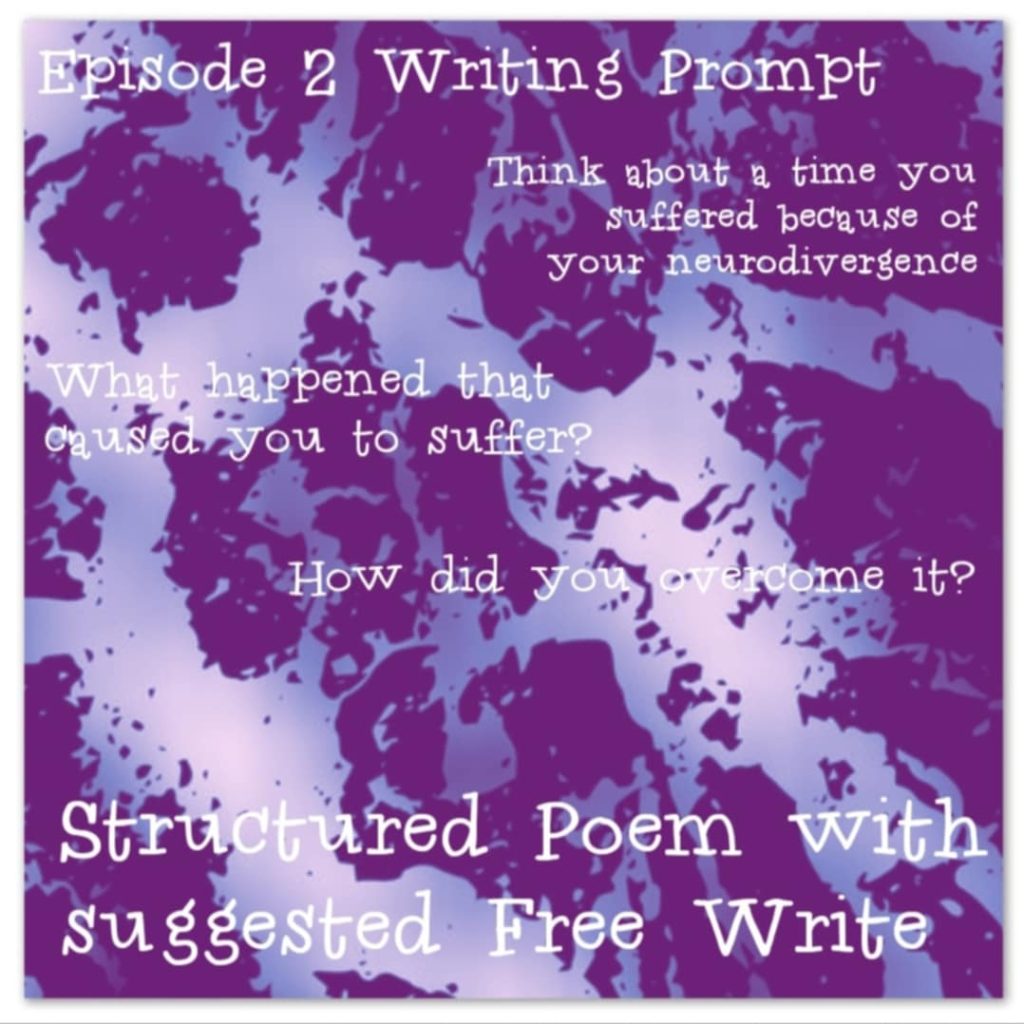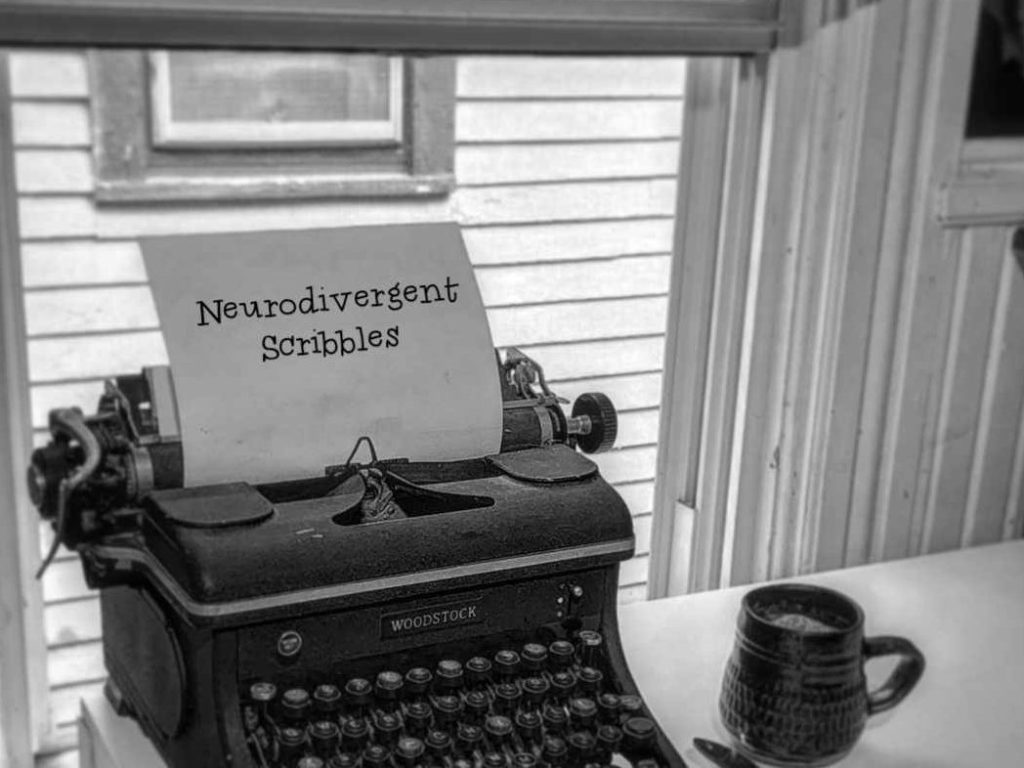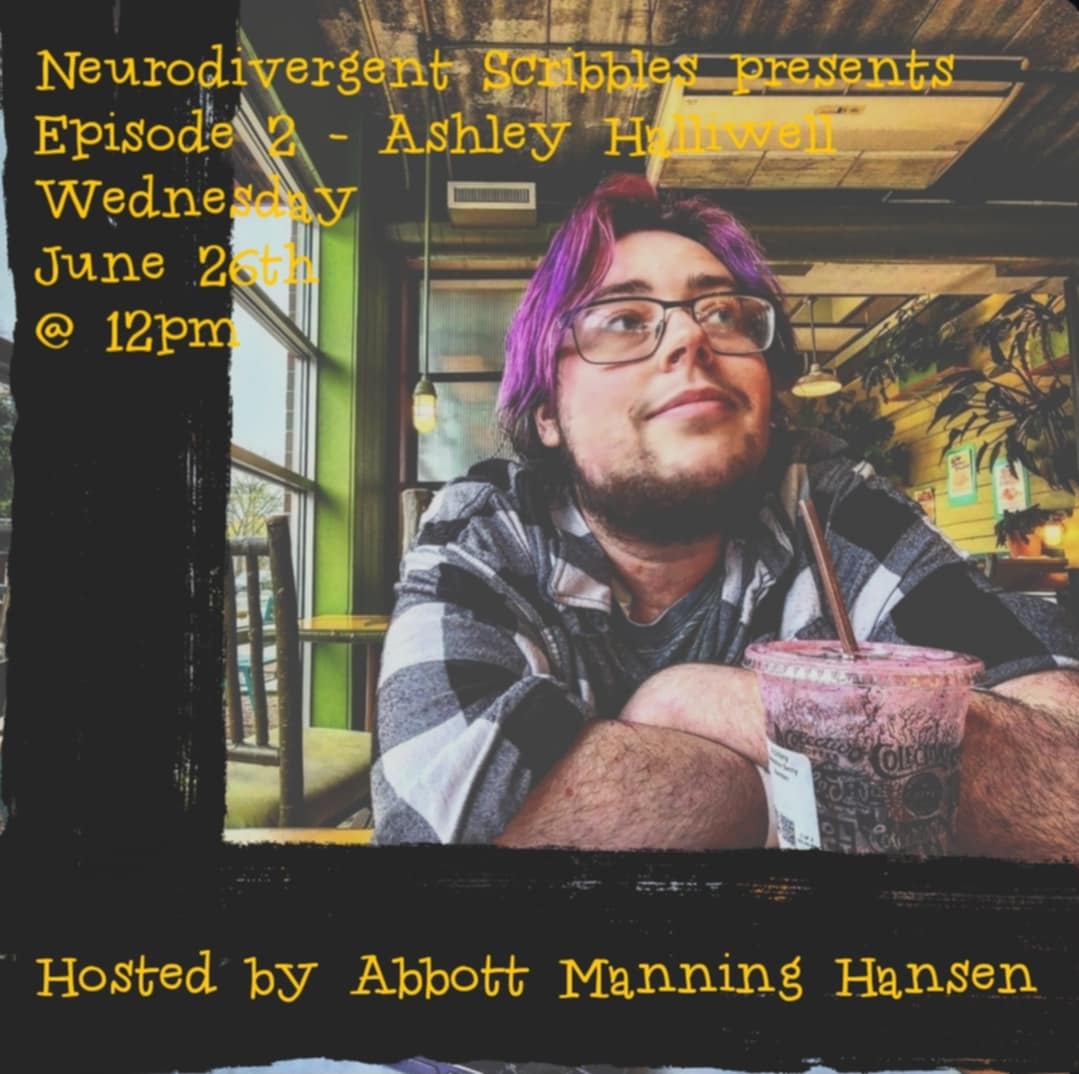https://opensorceryy.co
X(Formerly Twitter) – @opensorceryy
Instagram – @opensorceryy
Threads – @opensorceryy
Tumblr – @neonominous
Bandcamp – @candyfortrees
Tik Tok – @opensorceryy
Author photo courtesy of Anthony M Halliwell on Instagram @aurelie.system
Transcript
Welcome to Neurodivergent Scribbles, a writing podcast curated for neurodivergent people, by neurodivergent people. Today is Friday, June 28th, 2024. I’m your host, Abbott Manning Hansen.
Content Warning – Today’s episode discusses themes of abuse, war, neglect, violence, and gore. Listener discretion is advised.
First, before we hop into the episode, I do want to offer my apologizes. Normally, we do drop an episode of Neurodivergent Scribbles on Wednesday at noon. Obviously, today is not Wednesday; it is Friday. And it is far past noon local time. So, I want to apologize for not dropping the episode earlier. I had moved this weekend and I got sick immediately, thereafter, so I was unable to record like normal. So, again, I do offer my apologizes to all of you. And I want to thank you so much for your patience and your patronage.
Today’s featured writer is Ashley Halliwell. Ashley Halliwell is an accomplished artist for not having reached 30, yet. From the age of 11, they were trained professionally as a choral singer. At age 14, they released their first album. They have since released over a dozen more, with another in the works. They have created various visual art pieces, from painting, to digital masterpieces, since they were 3. They have acted since they were 7, engaging in productions of the self-produced variety, as well as local and school related productions. While acting, they also wrote, creating their first poems at age 5, and having written plays, serial fiction, essays, nonfiction blog posts, research articles, songwriting, short fiction, and self published poetry collections in the last two decades. Ashley’s writing has always been one thing: an outlet. From their songs, to their poems, to their self-proclaimed “shit-posting empire,” Ashley has poured their lived experiences into their work. In doing so, they have become relatable; speaking to experiences that have, until now, never had a voice. They are honest, raw, and unapologetically authentic in how they deliver the messages woven through their many adventures. They have since used their platform as a multi-faceted artist to serve as an unwitting advocate for the black sheep, the disowned, the weirdos, the misfits, and the healing traumatized people the world over. Their popularity has also made it possible for them to organize and operate a mutual aid community for individuals with disabilities. Their various social media will be in the description for your viewing pleasure. Originally from the heart of Texas, Ashley came from old money and was homeschooled. But they were raised with an entrepreneurial mindset, where resourcefulness and critical thinking skills were key. The idea of working for what you want was not lost on them. Having traveled all over the world and lived in various places within the US, Ashley learned their worth, becoming larger than life and creating positive change for themselves and others they interacted with. They serve as an example of what life can be when you live in an unapologetic authentic manner, never letting others dictate who you are and what your truth is, and rising from the ashes of trauma new and stronger than before. This phoenix reborn is why I decided to feature Ashley. They prove that in climbing through the depths of the darkness, there is strength in moving forward toward the light of a better future.
Singing Molten Gold To The Morning: Poems is a collection of poetry written by Ashley Halliwell under the pseudonym Perzival D.H.C. Dunn-Blackthorne, the second of two collections written under this nom de guerre. Today’s excerpt is Guernica, parts 1-2 from Singing Molten Gold To The Morning: Poems. Let’s dive in, shall we?
Guernica –
I. 26 april 1937…
I don’t know what i do best
Anymore
Except turn pain into something
Beautiful
But what about the horrors of it
And not the glory?
I want to take what I feel and
Not what I say
Turn it into something 11 feet
Tall and 25 feet wide
But my hands are little
My hands are little and no
Paintbrush is small enough to
Catch
All the detail
I’m tired of walking over
Thresholds of bombed out
Buildings or a half built house
I’m tired of only seeing rubble
I’m a builder, damnit
I’m supposed to build people up
I’m supposed to help
Not have nightmares like
Flashbacks that crush me!
So I dare myself
Now –
Put your own oxygen mask on
Before you
Drop that bomb
And then stay awhile
Before flying away
II. Thresholds are for brides
And I was a bride once
But that was a moment and
I wore a dress as red as blood
People asked why I did that
I know why I did that now
I didn’t know how else to say I was angry
When my mind was taped shut and
I was
Kept in the fog
Damn those pills!
Damn the nightmares!
Damn that house that should have caught fire
With all inside!
I am not the crazy child kept in the attic!
Not anymore
I am the human unchained,
I am the one that walks free!
I have doors now
I have miles in my pockets
I can and will lock you out
And there’s blood on their hands
They kicked a child
They should have loved the child
But when they dropped the bombs
The empty house of my mind caved in.
But the structure is stronger than that
I am stronger than that
And this is me calling it what it is…
You make your own hell,
I say to the bombers
I say to the horrors that I experienced
Some people see battlefields
I have seen a mind turned inside out
I have been trapped in my own body
I have seen my innocence die before me
And I’ve shouted into the hole of loss
And I’m still hearing the infinite echo.
I don’t know which is worse
You make your own hell,
I say to the demons I fight
Your hell is not mine,
Your chains are not mine,
I am not your wall to punch.
I’m not a pewter cup to drink
From and laugh with
Your hell is not mine
Not anymore.
This is me calling it what it is…
Hell.
And I enter it on my own terms.
Not yours,
Not anymore.
In Singing Molten Gold To The Morning: Poems, the piece entitled Guernica is split into seven parts. Each part beautifully plays into the next, but for this examination, we’ll look at the first two. Part one speaks to the painting of the same name by Spanish artist, Pablo Picasso. Guernica is an anti-war oil painting that portrays suffering shaped by violence and chaos. It is a gory display of gray-scale agony that was unlike Picasso’s more vibrant works. This theme rolls over into part two. Part two of Guernica speaks to the hell endured by a former bride through childhood trauma and medical neglect. A hell the bride walks through now, but on their terms, claiming their strength of will and removing themselves from the abuse of those who were supposed to love and nurture them. Something often overlooked by neurotypical and abled individuals is the abuse neurodivergent and disabled individuals endure through no fault of their own. Being emotionally abandoned by a parent when you don’t fit their idyllic vision of what you should be. Facing the violent onslaught of bullying from your peers. Educators ignoring, or worse, berating you for not measuring up to the rest of the class. Society deciding that being neurodivergent and/or disabled is all you are and ever will be, assuming you’ll be nothing more than a burdensome drain on the community and its resources. How it’s that much more difficult to find genuine love and kindness compared to our neurotypical and abled counterparts. For today’s prompt, I want you to think about a time you suffered because of your neurodivergence. What happened that caused you to suffer? How did you overcome it? Let this prompt be a structured poem. There are a variety of different structures to poetry. I’m personally very fond of Spenserian sonnets. Rhyme and iambic pentameter make my brain happy. But you can use any poem structure you like best! Haiku, sonnet, limerick, an ode, villanelle, free verse, and more. This one isn’t timed, but I would recommend doing some free writing first to get your thoughts down before jumping into writing a poem. Free writing can allow you to gather your thoughts on any subject, which can assist in finding patterns and how you want to move forward with expressing those thoughts in the form of a poem. And do so however is most comfortable and accessible for you, whether that be writing long hand, typing on a computer or typewriter, typing on your phone, or using a speech-to-text program to dictate your thoughts in a notes app on your device. This prompt will be posted on our various social media for you to reference later, all of which are connected to our Linktree in this episode’s description. Be sure to submit your writing prompt to the podcast email, nd.scribbles.pod@gmail.com, for a chance to have your work featured at the beginning of the next episode!
Today’s ending quote: “Our story may have any number of endings but its start is a singular choice we make today.” – Dr. Faisal Khosa, Associate Professor in the Department of Radiology at Vancouver General Hospital, University of British Columbia. He is passionate about giving back through coaching and mentoring students and his mentoring has benefited students all over the world.
My name is Abbott Manning Hansen, host of the podcast, Neurodivergent Scribbles. Thanks for listening, and have a creative day, my fellow Scribblers!



Leave a Reply